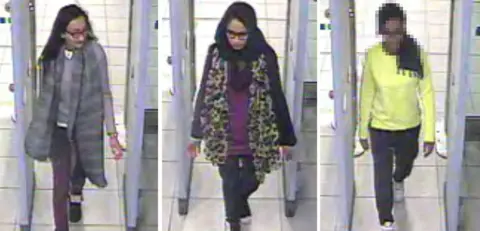Shamima Begum loses final UK court bid over citizenship
 Getty Images
Getty ImagesShamima Begum will not be allowed to challenge the removal of her British citizenship at the Supreme Court, judges have ruled.
The 24-year-old hoped to overturn the government's decision to revoke her citizenship on national security grounds after she travelled to Syria as a teenager to join the Islamic State group.
Justices at the UK's highest court said Ms Begum could not appeal against an earlier Court of Appeal ruling as the grounds of her case "do not raise an arguable point of law".
It was Ms Begum's last chance to challenge the revocation of her citizenship within the UK legal system. But her lawyers told the BBC they would take the case to the European Court of Human Rights (ECHR).
Ms Begum, who left Bethnal Green, east London, with two schoolfriends in 2015, was later found in a Syrian refugee camp.
She married an Islamic State fighter soon after arriving and went on to have three children, none of whom survived.
Ms Begum was stripped of her British citizenship on national security grounds in 2019 by the then-Home Secretary Sajid Javid, leaving her unable to return to the UK.
She remains in a camp controlled by armed guards in northern Syria.
Last year, she lost her appeal against the decision to revoke her citizenship at the Special Immigration Appeals Commission (SIAC).
She then took her case to the Court of Appeal - where three judges unanimously dismissed her bid to regain British citizenship in February.
Then in March, Ms Begum lost an initial bid to challenge the removal of her citizenship at the Supreme Court.
Her remaining option was to ask the Supreme Court directly for permission to have her case heard.
However, on Wednesday three justices at the Supreme Court unanimously dismissed the bid.
Lords Reed, Hodge and Lloyd-Jones found that the grounds on which she had based her case did not legally undermine the decision to strip her of her UK citizenship.
These included questioning the legality of her not being able to argue against the decision to strip her of her citizenship before it took place.
In a statement, Ms Begum's legal team said it "will take every possible legal step" to restore her citizenship, including petitioning the ECHR in Strasbourg to hear her case.
 Met Police / PA
Met Police / PAIt said that the Supreme Court had "left resolution" to the Strasbourg court.
In their ruling, the justices found it was a matter for the European court to decide whether the process to deprive Ms Begum of British citizenship should have considered whether she was a potential victim of trafficking.
The Supreme Court justices also affirmed an earlier ruling which found those concerns had no material bearing on the decision under UK law.
Her lawyers added: "It is a matter of the gravest concern that British women and children have been arbitrarily imprisoned in a Syrian camp for five years, all detained indefinitely without any prospect of a trial.
"All other countries in the UK's position have intervened and achieved the return of their citizens and their children."
Reacting to the ruling, Maya Foa, director of human rights charity Reprieve, said: "Exiling British nationals like Ms Begum is about politics, not the law.
"The prior government’s failed do-nothing approach must be abandoned. Our politicians should take responsibility and repatriate the small number of British families in this position so their cases can be dealt with here in Britain."
Ms Begum is held in Camp Roj in north-east Syria, which holds nearly 3,000 individuals, 65% of whom are children, according to the UN.
Amnesty International UK's refugee and migrant rights director Steve Valdez-Symonds described the ruling as "deeply concerning" as she was "now exiled in dangerous and inhuman conditions" in the detention camp.
He added: "Stripping Shamima Begum’s nationality was profoundly wrong - she is and has always been British."
The Home Office said it noted the decision of the Supreme Court, but that it "would be inappropriate to comment further at this time".
The two other girls Ms Begum travelled to Syria with - Amira Abase and Kadiza Sultana - are now both thought to be dead.
The Shamima Begum Story podcast is available on BBC Sounds and a feature length documentary of the same name is on BBC iPlayer (UK only).
